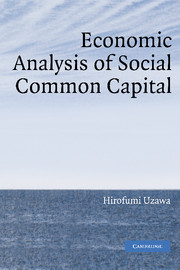Book contents
- Frontmatter
- Contents
- List of Figures
- Preface
- Introduction: Social Common Capital
- 1 Fisheries, Forestry, and Agriculture in the Theory of the Commons
- 2 The Prototype Model of Social Common Capital
- 3 Sustainability and Social Common Capital
- 4 A Commons Model of Social Common Capital
- 5 Energy and Recycling of Residual Wastes
- 6 Agriculture and Social Common Capital
- 7 Global Warming and Sustainable Development
- 8 Education as Social Common Capital
- 9 Medical Care as Social Common Capital
- Main Results Recapitulated
- References
- Index
1 - Fisheries, Forestry, and Agriculture in the Theory of the Commons
Published online by Cambridge University Press: 18 December 2009
- Frontmatter
- Contents
- List of Figures
- Preface
- Introduction: Social Common Capital
- 1 Fisheries, Forestry, and Agriculture in the Theory of the Commons
- 2 The Prototype Model of Social Common Capital
- 3 Sustainability and Social Common Capital
- 4 A Commons Model of Social Common Capital
- 5 Energy and Recycling of Residual Wastes
- 6 Agriculture and Social Common Capital
- 7 Global Warming and Sustainable Development
- 8 Education as Social Common Capital
- 9 Medical Care as Social Common Capital
- Main Results Recapitulated
- References
- Index
Summary
INTRODUCTION
In the past three decades, we have observed a significant change in the nature of environmental problems and the economic, social, and cultural implications that the degradation of the natural environment has brought about. During the 1960s and early 1970s, our primary environmental concern was with the disruption of the environment and the ensuing hazard to human health caused by the rapid processes of industrialization and urbanization, both of which were taking place at an unprecedented, rapid pace in many parts of the world. The environmental damages were mainly caused by the emission of chemical substances such as sulfur and nitrogen oxides that themselves are toxic and hazardous to human health. In recent years, however, we have become increasingly aware of the extensive degradation of the global environment, as exemplified by such phenomena as global warming, the extensive depletion of tropical rain forests with the accompanying loss of biodiversity, and pollution of the oceans. Global environmental problems are primarily caused either by the imprudent use and excess depletion of natural resources or by the emission of chemical agents, such as carbon dioxide in the case of global warming, that by themselves are neither harmful to human health nor hazardous to the natural environment but on a global scale, contribute to atmospheric instability and global disturbances.
As for the industrial pollution and similar environmental problems that were rampant and widespread in the 1960s, the causal relationships were fairly easy to recognize, from both a social and scientific point of view, and the remedial measures were not too difficult to take, from both an economic and a political point of view.
- Type
- Chapter
- Information
- Economic Analysis of Social Common Capital , pp. 15 - 75Publisher: Cambridge University PressPrint publication year: 2005



